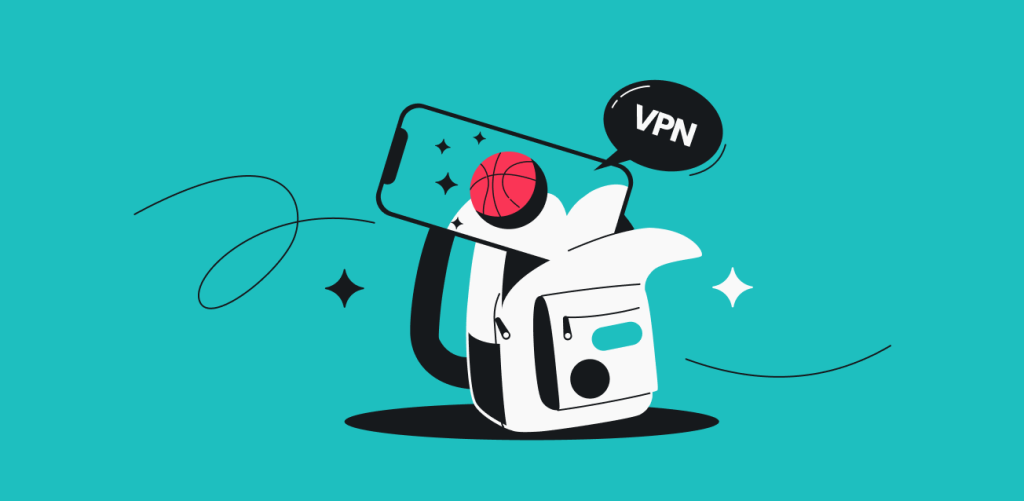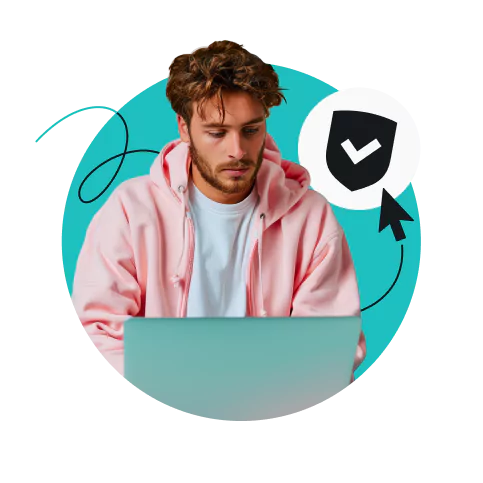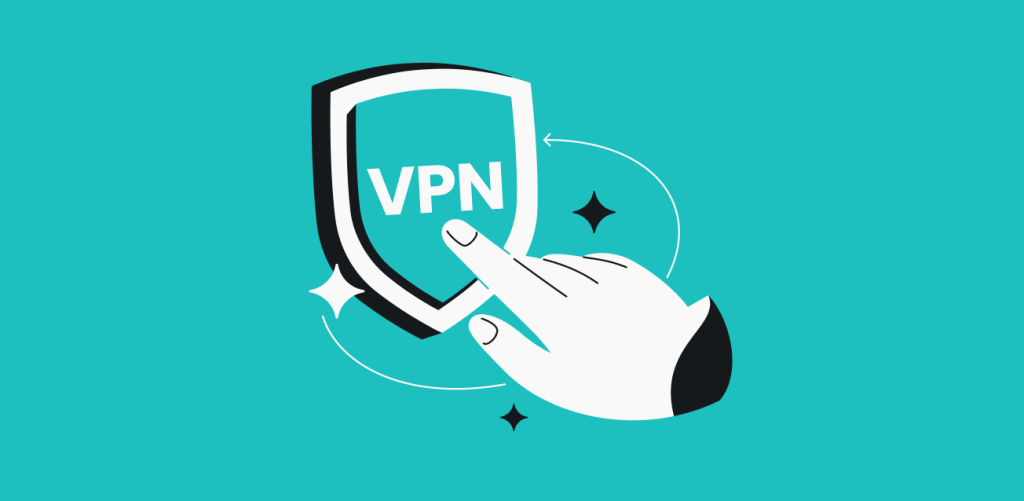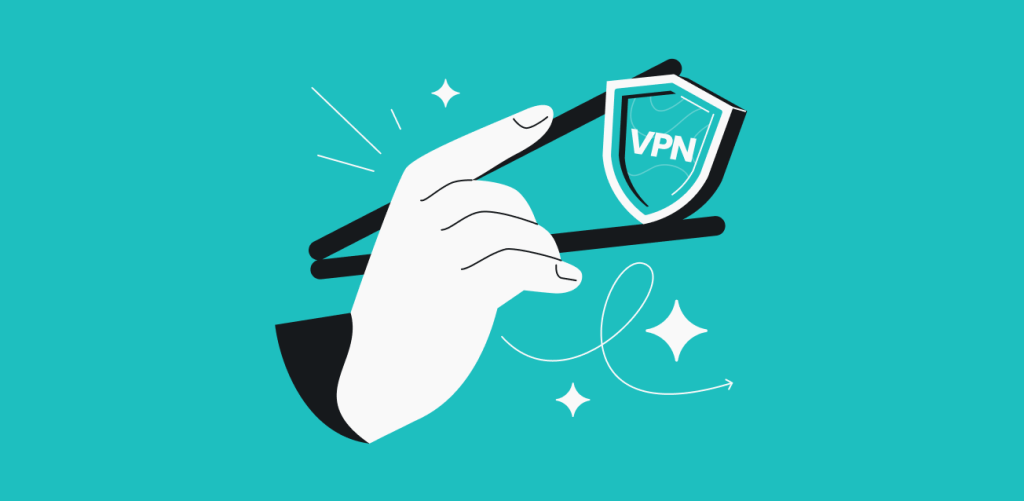
A VPN (Virtual Private Network) helps expats like you reach their home country’s online services from anywhere in the world. Whether you want to catch up on local news, manage your internet banking, or safely access your favorite streaming sites, a VPN makes it easy.
Read on to learn what a VPN for expats can do.
Table of contents
What is a VPN?
A VPN is a cybersecurity tool that encrypts your internet connection and hides your IP (Internet Protocol) address. Using one protects your data and boosts online safety — wherever you are.
Think of a VPN as a private highway linking your device to the internet. Only people with the right credentials can access it, meaning all your online activities are shielded.
VPNs let you surf the web privately, securely, and freely from a different virtual location.
How does a VPN work?
In most cases, you’ll download a VPN to your device like any other app. Turn it on, and it’ll route your internet connection through a designated server in a different country. This changes your IP address and encrypts your data.
VPN apps let people achieve two main things:
- Changing your IP address makes your true location unrecognizable to pages you visit, making you harder to track.
- Encrypting data makes it nearly impossible for hackers, third-party snoopers, or even your nosy ISP (Internet Service Provider) to read your info.
Yes, these benefits aren’t exclusive to expats and those traveling abroad — they’re the key advantages that all of us can enjoy online.
So, let’s look at the specific use cases of a VPN for expats.
Why do expats need VPNs?
VPNs let expats surf the web from international locales as if they were still in their own backyard. Using your home country’s IP address means you’ll enjoy the same websites, search results, and streaming services you’re used to.
For instance, maybe you’re an American who’s moved across the pond after accepting a post in Europe. With a single click, you can connect to a VPN server in the United States and enjoy US-only web content, mobile platforms, TV channels, and more.
The thing is, different VPN providers excel in specific areas. Surfshark provides a powerful mix of speed and security, backed by a 30-day money-back guarantee.
Here are the top eight reasons why expats should use a VPN:
-
Reach your homeland digitally
You might want to read the news from your trusty, local site once abroad. There’s one problem — many media sites don’t follow foreign privacy laws and block their content from foreign IP addresses.
Or maybe you need to use government websites to help with your move. Well, these often restrict access, too.
In a nutshell, changing your IP address via a VPN server is your best bet for reaching your most important sites from back home, whether they’re essential or just nice to have.
Disclaimer: Please note that using Surfshark services for any illegal activities is strictly forbidden and violates our Terms of Service. Make sure that any use of Surfshark services for your particular activities conforms to all relevant laws and regulations, including those of any service providers and websites you access using Surfshark.
-
Book cheaper airline tickets
Once you get settled, you’ll likely feel a little homesick. When you’re ready to book that first trip back home, you may be shocked to find flights are more expensive than you remember.
That’s because many airlines use geographic price discrimination, so you’ll see higher fares because you’re in a different location.
So, do you have to wait, save up, and settle for Skype calls with folks you can’t visit? Nah.
You turn on your VPN app, get a dedicated IP address, and search for more affordable flights. You heard right — buying airline tickets with a VPN is much cheaper.
-
Connect to public Wi-Fi safely
Picture this — you’ve freshly landed in Paris, ready to kick off your new job. You’ve found the cutest corner café — one giving off that iconic French charm — to set up your remote workplace.
Sounds great, right?
Well, before sipping your café au lait and connecting to the public Wi-Fi, there’s one thing you need to know — public Wi-Fi isn’t as safe as you may think. In fact, 40% of people say they’ve had their information compromised while using public Wi-Fi.
Public networks expose you to hackers who may attempt to steal your data or eavesdrop on your online activities. To protect yourself, going with a VPN service is a must. It’ll bolster your online security, letting you dive into your work — and that croissant — without a worry.
-
Access financial accounts with ease
Has your bank ever given you trouble while traveling overseas? You wouldn’t be the first.
A bank’s priority is protecting your finances. Unfortunately, that often comes with many restrictions, and banks may deny you access to your accounts if they detect a foreign IP address.
Never fear — using a VPN allows you to change your IP address.
Let’s say you’re in the UK, and your bank is in Italy. Simply open your VPN, choose Italy as your server network location, and presto — you’ll gain access to your bank account.
And a VPN’s benefits don’t stop there. From unlocking banking features on mobile devices to enabling anonymous payment methods, a VPN gives expats complete financial freedom.
-
Evade local censorship
Some oppressive or authoritarian countries restrict internet access, especially when it comes to social media sites. For example, if you’re in China and want to check your Facebook account to let your family know you made it safely, you’re out of luck.
Or are you?
What’s that? A VPN service has come to your rescue.
Suddenly, you can open Facebook by connecting to a server in a different country. And look at that — Mom’s already messaged you asking for a selfie by the Great Wall.
-
Improve network performance
Ever felt like your internet abroad was moving at a snail’s pace?
Well, you might be a victim of ISP throttling. ISP throttling is when your internet provider puts the brakes on your speed, grinding any online activity — gaming, binging your favorite show, or jumping on an intercontinental video call — to a halt.
But wait — there’s good news. In certain cases (based on the type of throttling), you can bid adieu to throttled connection speeds with a VPN. Connect to a VPN from one of several server locations and enjoy smoother sailing online.
-
Log in to your key work networks
Many expats need to work on the go to collaborate with team members or stay connected with the home office.
With a VPN, you can access key work networks with confidence, knowing that your connection and data are protected. Whether you’re looking to gain entry to shared drives or log in to company services, a VPN provides a reliable connection to your entire professional expat network.
The same is true for small businesses cooperating with freelancers and remote workers. A VPN can be a valuable part of your team’s online privacy solution, ensuring safe access to vital work resources and giving all parties the flexibility to work wherever they go.
-
Stay safe and private online
I understand this might not be as shiny as the other reasons, but this last point is actually the most crucial benefit a VPN can bring expats.
We often forget that online privacy and safety are just as important as our physical safety. As more of our time and activities move online, our data becomes increasingly valuable — and vulnerable — to hackers, ISPs, and data brokers.
A VPN app is your best bet for maximizing your online security and keeping you and your internet traffic safe in this sea of threats.
How do you choose the best VPN for expats?
Knowing what a VPN does can be complicated — choosing the best provider isn’t. Look out for these features to pick the best VPN for you:
- Many server locations: go with a VPN with servers in your home country (Surfshark offers servers in 100 countries).
- Fast connection speed: look for a fast VPN. You don’t want to be stuck with loading screens and long download times.
- Multi-device support: the best VPNs protect much more than your computer. Opt for one that protects unlimited devices, including your phone, tablet, TV, and so on.
- Kill Switch: a Kill Switch is a handy feature that can interrupt internet access if your VPN connection drops. Choose a VPN with a built-in Kill Switch to ensure you never browse unprotected.
Looking for a VPN that delivers all of the above? Surfshark is an excellent VPN for expats, offering a widespread server infrastructure and unlimited simultaneous connections. Feel free to see how Surfshark stacks up with other popular VPNs.
Pro tip: Don’t fall for the promise of a free VPN. These are often outdated, might sell your data, and offer fewer features than paid alternatives.
Final thoughts: a VPN makes expat life easier
We all know settling down in a new country can be hard. So, let a VPN like Surfshark make it easier for you.
Forget how long it takes to get into your bank account, avoid censorship, and find cheaper ticket prices. Whatever you use it for, a VPN can be a guiding light on your journey.
FAQ
Can a VPN put you in a different country?
Yes, a VPN connection can make your internet traffic appear to be from a different country. Unfortunately, no teleportation powers yet…
How do I get an overseas VPN?
Any good VPN provider is an overseas VPN provider, as it can make it look like you’re in another country. Check their server network for the locations they offer, and you’ll be fine.
Is there a free VPN that can change location?
Probably. But you shouldn’t use one. Free VPN providers may monetize your data and bombard you with annoying ads. Nobody wants that.
Can I choose which US city I connect to?
Yes. If a VPN offers US servers, you’ll probably be able to choose which city you connect to.
With Surfshark, you can connect to servers in San Francisco, Los Angeles, Salt Lake City, Houston, Detroit, New York, Miami, and more!
Why are US web services unavailable abroad?
There are three main reasons why US services would be unavailable abroad:
- Privacy law compliance: for example, some media sites aren’t GDPR-compliant, so they choose not to display their content in the EU.
- Censorship: authoritarian regimes may restrict access to the internet, and some of these blocked services can come from the US.
- Geoblocking: copyright laws and distribution agreements prevent certain services from displaying their content.
What’s better for expats — VPN or RDP?
A VPN is better for expats who need a secure and private connection while browsing online, accessing personal services, or connecting to their home network from abroad. Although RDP is useful for direct access to a home or office computer, expats should make sure to use RDP over a VPN for added security, especially on public networks.





